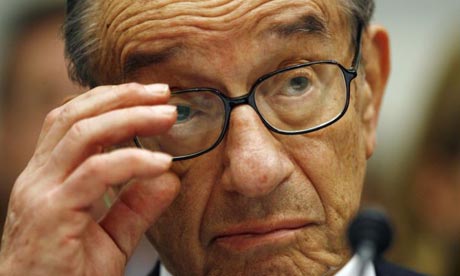Results 1 to 1 of 1
Thread Information
Users Browsing this Thread
There are currently 1 users browsing this thread. (0 members and 1 guests)
Threaded View
-
09-09-2009, 02:31 PM #1Senior Member


- Join Date
- May 2007
- Location
- South West Florida (Behind friendly lines but still in Occupied Territory)
- Posts
- 117,696
Financial crisis will not be the last, former US federal cha
Financial crisis will not be the last, former US federal chairman warns
• Britain will be harder hit due to its globally orientated economy
• Strategist criticises comments and apparent 'lack of humility'
Comments 2
Julia Kollewe guardian.co.uk,
Wednesday 9 September 2009 11.57 BST

Alan Greenspan said Britain would be hit harder than the US by the collapse in world trade. Photograph: Kevin Lamarque/Reuters
The current financial crisis gripping the world will not be the last, former US Federal Reserve chairman Alan Greenspan has warned, despite describing it as a "once in a century type of event".
He also predicted that Britain would be harder hit than the US by the collapse in world trade.
He told BBC Two's The Love of Money series: "Obviously we've both suffered very considerably but ... Britain is more globally orientated as an economy and the dramatic decline in exports globally and trade generally following the collapse of Lehman Brothers had dramatic effects in the financial system of Britain."
"It's going to take a long while for you [Britain] to work your way through this."
Speaking a year after the spectacular failure of US investment bank Lehman Brothers, which plunged the world into financial and economic chaos, the former Fed chief said: "The crisis will happen again but it will be different."
Financial crises "are all different, but they have one fundamental source," he explained. "That is the unquenchable capability of human beings when confronted with long periods of prosperity to presume that it will continue."
Blamed by some for not doing more to stave off the current downturn, Greenspan denied any responsibility.
"It's human nature, unless somebody can find a way to change human nature, we will have more crises and none of them will look like this because no two crises have anything in common, except human nature."
Howard Wheeldon, senior strategist at BGC Partners, strongly criticised Greenspan's latest comments.
"It contains absolutely no humility or even the remotest hint of responsibility that he himself might have ensured the situation we have just gone through could have been avoided. The word 'sub-prime' does not get mentioned at all as far as I can see – neither do the words I am sorry!"
"Apparently Mr Greenspan believes the problems that we have suffered can just be put down to 'human nature'. By that he could be suggesting that whatever regulations that might have been put in to stop the 2008 rot, they would have been unstoppable. Maybe so, but I prefer to believe that if suitable laws and rules are in place then human kind and particularly those that work in financial markets will, and generally always do, observe the rules. Sure there is always the odd rogue like Madoff but at some point they are always found out," Wheeldon said.
The credit crunch was triggered by the US sub-prime mortgage slump, but Greenspan said any factor could have acted as a catalyst. "Something sooner or later would have emerged," he said.
Greenspan also said that the world's financial institutions should have seen the crisis coming.
"The bankers knew that they were involved in an under-pricing of risk and that at some point a correction would be made," he said.
"I fear too many of them thought they would be able to spot the actual trigger point of the crisis in time to get out."
To prevent future crises, he called on financiers and governments to clamp down on fraud and increase capital requirements for banks.
Greenspan also warned governments against resorting to protectionism. "The most recent endeavour to re-regulate is a reaction to the crisis. The extraordinary impact of these global markets is making a lot of financial people feeling they have lost control.
"The problem is you cannot have free global trade with highly restrictive, regulated domestic markets."
http://www.guardian.co.uk/business/2009 ... -greenspanJoin our efforts to Secure America's Borders and End Illegal Immigration by Joining ALIPAC's E-Mail Alerts network (CLICK HERE)


 LinkBack URL
LinkBack URL About LinkBacks
About LinkBacks






 Reply With Quote
Reply With Quote

Migrants Breach Fortified Border Barrier, March Through Texas...
05-16-2024, 08:20 PM in illegal immigration News Stories & Reports